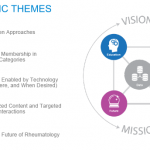
The ARHP Research Subcommittee has recently developed and delivered webinars about new methodologies for study design and the use of novel analytical approaches.
Rawpixel.com / shutterstock.com
Editor’s note: The new Pillar Talk column is developed by the ARHP Executive Committee in an effort to share information about ongoing activities related to our four pillars: Education, Practice, Research and Advocacy.
The ARHP Research Subcommittee is committed to promoting research and enhancing research opportunities for health professionals and researchers working in rheumatology. A key area of focus over the past two years has been enhancing the knowledge and skills of our membership through the visibility and dissemination of exceptional research. Looking forward, we plan to increase our alignment of ARHP research priorities with the new ACR Strategic Plan.
Increasing Visibility of Research for ARHP Membership
The ARHP consists of a diverse group of individuals from many fields who strive to enhance the lives of the patients we serve. In our previous ARHP Pillar Talk article about clinical practice (“It Takes a Village,” August 2017), we noted that 14 different categories of health professionals make up the membership of ARHP. A consistent theme across these disciplines is the need to conduct research to find more effective and scalable interventions, explore models of care or efficiencies in delivery models, and understand the multifactorial pathogenesis of rheumatic diseases, to name a few critical targets.
The ARHP Research Subcommittee seeks to increase research visibility to accommodate the needs of the various disciplines. To do this, we have focused on delivering webinars about new methodologies for study design and the use of novel analytical approaches. For example, last year we offered a webinar, “Expanding the Research Toolbox: A new framework for building effective and efficient interventions.” These webinars have been an efficient approach for communicating with our membership. Typically, 30–50 participants register for the actual event; we continue to archive these webinars and make them available on our website. Some of these archived webinars have been viewed more than 250 times by our membership and outside stakeholders.
Another approach to increasing ARHP research dissemination is through Annual Meeting proposals. These proposals tend to focus on a wide range of research topics and are typically delivered by experts in our ARHP membership. For example, our Research Subcommittee hosted a session at the 2015 Annual Meeting titled, “Moving Evidence to Action: Translate Research into Patient Care.” In addition, at the 2016 Annual Meeting, the ARHP Research Subcommittee hosted a session on “Comparative Effectiveness Trials in Rheumatology: Rationale, Design and Analysis.”
These are just a couple of examples of our talented ARHP members and the ongoing, cutting-edge rheumatology research. We look to find new and exciting advances in research methods to disseminate to our membership. Be on the lookout for additional sessions at the Annual Meeting in San Diego.
The window to the world for our organization is our website. Our committee is working on changes to our website so researchers will feel more at home. We have implemented some of those changes already, such as providing an easier link to find research from the home page and linking to some of our content related to outcomes measures that was published in a supplement to Arthritis Care & Research.
In the coming months, we plan to seek feedback on changes important to our researchers among our membership. Some of you may be asked to participate in a survey that will ask about specific and general changes to the ACR website to emphasize research. We will also have engagement from the ACR Committee on Research as they have agreed to join us in this endeavor to facilitate and welcome researchers to utilize our website for information.
Enhancing Our International Collaborations
Collaboration between organizations is an important way to maintain synergy, share resources and increase awareness of themes important across organizations. The Research Subcommittee has been working to facilitate our collaborations with our international rheumatology partners. For example, we have assisted the ARHP Executive Committee with developing topics and speakers for two previous joint proposals. One such joint proposal was on patient engagement; Staying at Work: Work Assessments and Rehabilitative Interventions for People with Inflammatory Arthritis was presented at EULAR 2017 in Madrid, Spain, and will also be presented at the 2017 Annual Meeting in San Diego. Another joint proposal is with the British Health Professionals in Rheumatology and ARHP on the topic of staying at work. The Research Subcommittee assisted both the international organizations and our ARHP Executive Committee on organizing speakers and the submission process of proposals to the respective meetings.
We have also initiated a conversation with our colleagues in the Canadian Arthritis Health Professions Association (AHPA) and the ARHP Practice Committee to explore the impact of these differing approaches and models of care on patient outcomes, experience and access to care. This may lead to further discussion of strategies to address rising healthcare costs in the U.S. and other countries.
Promoting Research in the ACR/ARHP Strategic Plan
The new ACR Strategic Plan was recently released, and it outlines the objectives, measurement criteria, targets and timeline for the College for 2017–2022. A major project for the ARHP Research Subcommittee is to align our goals with this strategic plan. For example, one of the strategic themes is to develop a sustained future for rheumatology by addressing research impact and advancing rheumatology research. One way in which this will be measured is through expanding recruitment, education and training of ACR/ARHP students, residents, fellows and early career investigators.
The ARHP Research Subcommittee plans to work closely to assist the ACR Committee on Research along with the ACR Early Career Investigator Subcommittee. In doing so, we hope to increase awareness and participation in such events as the Rheumatology Research Workshop and encourage early career investigators to present their research and align with mentors in the field of rheumatology. Additionally, we will promote events at the Annual Meeting that are geared toward junior faculty, early stage investigators and new investigators, such as the session being organized by the Early Career Investigators Subcommittee, How to Find the Right Grant at the Right Time: Meet the NIH and Foundation Leaders. This event, to be held at the 2017 ACR Annual Meeting on Nov. 8 from 9–10:30 a.m., will be an interactive session to meet one on one with program officers from the NIH and rheumatology foundation representatives. It’s opportunities such as these that we want to make our membership aware of to help promote and expand the role of rheumatology research.
We are grateful for our outstanding staff support, enthusiastic scientists and dedicated ARHP Research Subcommittee members and small project volunteers. If research is an interest of yours, consider volunteering as a committee member or to work on a small project in the coming year. If interested, take a few moments to complete the Volunteer Opportunities Survey. Direct any questions or feedback regarding this article to [email protected].
 Adam P. Goode, DPT, PhD, ARHP Research Subcommittee chair, completed his PhD in epidemiology at the University of North Carolina-Chapel Hill and doctorate in physical therapy at Duke University. He is an associate professor in the Duke Department of Orthopedic Surgery and a core faculty member at the Duke Clinical Research Institute.
Adam P. Goode, DPT, PhD, ARHP Research Subcommittee chair, completed his PhD in epidemiology at the University of North Carolina-Chapel Hill and doctorate in physical therapy at Duke University. He is an associate professor in the Duke Department of Orthopedic Surgery and a core faculty member at the Duke Clinical Research Institute.
 ARHP President Afton L. Hassett, PsyD, is a clinical psychologist and an associate research scientist in the Department of Anesthesiology at the University of Michigan. As a principal investigator at the Chronic Pain & Fatigue Research Center, she conducts interdisciplinary research related to exploring the role of cognitive, affective and behavioral factors in pain and functioning in rheumatologic populations.
ARHP President Afton L. Hassett, PsyD, is a clinical psychologist and an associate research scientist in the Department of Anesthesiology at the University of Michigan. As a principal investigator at the Chronic Pain & Fatigue Research Center, she conducts interdisciplinary research related to exploring the role of cognitive, affective and behavioral factors in pain and functioning in rheumatologic populations.


